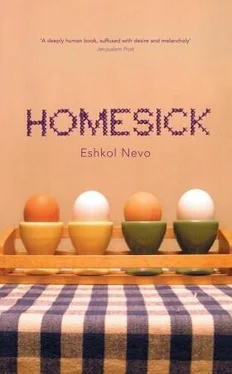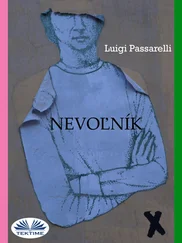Eshkol Nevo - Homesick
Здесь есть возможность читать онлайн «Eshkol Nevo - Homesick» весь текст электронной книги совершенно бесплатно (целиком полную версию без сокращений). В некоторых случаях можно слушать аудио, скачать через торрент в формате fb2 и присутствует краткое содержание. Год выпуска: 0101, ISBN: 0101, Издательство: Random House, Жанр: Современная проза, на английском языке. Описание произведения, (предисловие) а так же отзывы посетителей доступны на портале библиотеки ЛибКат.
- Название:Homesick
- Автор:
- Издательство:Random House
- Жанр:
- Год:0101
- ISBN:9781448180370
- Рейтинг книги:5 / 5. Голосов: 1
-
Избранное:Добавить в избранное
- Отзывы:
-
Ваша оценка:
- 100
- 1
- 2
- 3
- 4
- 5
Homesick: краткое содержание, описание и аннотация
Предлагаем к чтению аннотацию, описание, краткое содержание или предисловие (зависит от того, что написал сам автор книги «Homesick»). Если вы не нашли необходимую информацию о книге — напишите в комментариях, мы постараемся отыскать её.
Homesick
Homesick — читать онлайн бесплатно полную книгу (весь текст) целиком
Ниже представлен текст книги, разбитый по страницам. Система сохранения места последней прочитанной страницы, позволяет с удобством читать онлайн бесплатно книгу «Homesick», без необходимости каждый раз заново искать на чём Вы остановились. Поставьте закладку, и сможете в любой момент перейти на страницу, на которой закончили чтение.
Интервал:
Закладка:
And as long as he doesn’t steal the blanket away when they’re done.
*
I didn’t take a lot of pictures in the kindergarten. The teacher finally agreed after I pleaded and explained that I’m not from a newspaper, but I sensed that she didn’t trust me, and I didn’t want Sima to get thrown out because of me. But I did walk out of Shulamit’s Kindergarten with a few pictures, not good enough for my teachers, but interesting enough to keep for myself in a separate bag between the pages of my album. One picture shows a kid, shot from the back. He’s wearing a Chicago Bulls T-shirt with the number 23 — the number that Michael Jordan, ‘God’, wears. His black skullcap has slipped to the side of his head and he’s reading from a big book that, from its size, could be either a prayer book or a children’s book. There’s a picture of a rabbi hanging on the wall above him. Not Ovadia. Not Kaduri. Someone else. The framed rebbe is looking at the camera; the child isn’t. Then I took a series of pictures, not too many. Most of them are pretty ordinary, except for one that shows a boy whose curled sidelocks have fallen on to his cheeks and his little hand is resting on his heart as he stares longingly at a girl with a red hairband sitting next to him. But the most striking picture — which I added to my portfolio later — is of Dina, the teacher’s assistant. I asked her if I could take it when we were about to leave. I used a wide-angle lens to include in the frame the cardboard sign listing the advantages of the kindergarten. The sign said: Open from seven to four. Three full meals. Certified teachers. Under the supervision of the Ministry of Labour and Welfare. Reasonable prices.
Dina herself looks like another advantage of the kindergarten.
Looking at her, with her denim dress, her white long-sleeved top and the green shirt over it, you can’t help imagining how a pretty girl like her would look in a low-cut mini dress with her hair loose. I guess that she herself wasn’t concerned about that, because in the picture she’s completely relaxed. And beaming. Usually, when you look at a picture, you try to find the light source: the direction of the sunlight or the side the flash is on. In that picture, the light source is Dina herself. Her face is illuminated, her neck — the part that is exposed — is glowing, and her enormous green eyes (which are looking straight at the lens, just like I wanted) are gleaming. Dina was with us the entire time we were there, and I liked her from the first minute. The sound of her voice reminded me of my aunts on my father’s side, the side I liked, and I thought: if I had a child, I’d want him to have a kindergarten teacher like her. She walked around the kindergarten with us slowly, as if we weren’t disturbing her in the middle of the day, explained patiently how special the kindergarten was and answered Sima’s questions sincerely, even the provocative ones: Do they have to wear skullcaps? We don’t force anyone. The children themselves want to wear them. Could it happen that a boy comes home from kindergarten and tells his mother that she’s not dressed properly? Yes, things like that have happened. But on the other hand, we make it very clear to the children how important it is to honour their father and mother. Go to the kindergarten in Mevasseret, see how disrespectful the children are to their parents when they come to pick them up. You won’t see that here. And in Mevasseret, they’ll always look down on your son because he’s from the Castel. Here, everyone’s equal.
Sima nodded slightly, and I thought she was agreeing. Even I was having second thoughts when I heard what Dina had to say and especially when she stopped next to a boy who’d fallen in the sandbox and stroked his head until he calmed down.
*
On the way home, we didn’t speak. I let Sima absorb what she’d seen, kept my eyes on the uneven pavement and said to myself that I should fill all those holes with white sugar or salt and photograph them. I rolled around in my mouth the names of the streets we passed — Palmach Street, Convoy Street, Victory Lane — and thought that the War of Independence still hadn’t ended here. I thought that the empty basketball courts, especially the ones that had torn nets, could be an interesting subject for a project on loneliness. I smiled at the group of toothless old men watching us from a bench and, in my imagination, posed them for a class picture, with a little girl as their teacher standing beside them. And I planned an answer in case Sima asked my opinion.
But when we went into the house, she didn’t pour out her heart. All she did was ask me to keep an eye on Lilach for a minute, and went to have a shower. She stayed in the bathroom a long time — Lilach had already begun her pre-crying whining — and when she came out, she stood in front of the mirror in the living room combing her thin hair and said, I think best in the shower. Me too, I said. Every time I have to decide something important, I go into the shower. And she laughed. Ah, now I understand why we don’t have any hot water, and before I could fake an apology, she asked, one sugar, right? I said, don’t worry, I’ll make it, take Lilach for a while, she’s about to cry. Sima said, don’t be silly, those sounds are a sign that she’s happy. Can’t you see that she’s crazy about you? Don’t exaggerate, I protested, even though the compliment made me happy, and Sima took Lilach out of her cot and held her to her beautiful breasts, which were surprisingly firm after two babies, and asked, so what do you think about in the shower, Noa? I laughed: what do you mean? And she said, I tell you everything about myself, and you don’t tell me a thing. I’m starting to feel hurt. Don’t, I said, it takes me time to open up to people. And suddenly, as I was turning to take the milk out of the fridge, I wanted her not to give up, to keep on asking me. To get me to open up. Lately, I haven’t had any long talks with friends. After so many disappointments, Liat finally has someone serious, and although we met for coffee a year ago and she made fun of the women who ignore the rest of the world the minute they have a man, that’s exactly what’s happened with her. And Hila just came back from a trip to India, loaded with clothes in bright colours and black-and-white clichés — whatever happens is what’s supposed to happen, all rivers flow to the Ganges, that kind of stuff. I love her dearly, but if she tells me to go with the flow one more time when I tell her about something I’m upset about, I’ll just pull her short, annoying braids. No. I need someone who has no preconceived notions about me, someone who doesn’t already think Amir is fantastic, someone who won’t be worried about hurting my feelings, who’ll say what she thinks.
I brought the coffee over to the table, and before I could sit down, Sima’s question mark was already hanging in the air. So what happened with Amir? Nothing, I said, suddenly put off by the very directness I was hoping for from her. What makes you think something happened? I asked. She rocked Lilach and said, woman’s intuition, and I didn’t deny it, I didn’t try to gloss over it, but I didn’t really know what to tell her either, because it wasn’t really clear to me what, if anything, was bothering me, or how to translate the abstract feelings into concrete examples. But I started to talk anyway. I told her that I was a bit worried about that club for former mental patients where Amir volunteered. And that I thought it was having too much of an effect on him. Every night he has horrible dreams about the people there, dreams I can’t even listen to any more, but he keeps telling me every little detail anyway and he expects me to give him clever, carefully thought out interpretations. A few days ago, when I came home, I saw him through the window sitting in the living room talking to himself. I couldn’t hear anything, I just saw his lips moving, and maybe he was only singing along with the radio, but on the other hand, maybe he wasn’t. And then there’s all that time he spends with Yotam, the neighbour’s son, the one whose brother was killed. When I left the house, they were playing chess, and they probably still are. There’s something nice about it, true, but the boy’s in our house more than in his own, and sometimes, when I come home late, Amir acts weird, as if something is locked up inside him, and last Saturday we hardly touched each other, I mean, he came home from the club really down on Thursday and I was wiped out from Bezalel, and we didn’t actually fight, but every conversation we started turned into an argument and I found myself supporting experiments on animals and objecting to treating depression with drugs, or the opposite, just for the sake of argument, and the whole time, I felt something humming and buzzing in the background, like in the morning when Madmoni’s workers are drilling, do you know what I mean?
Читать дальшеИнтервал:
Закладка:
Похожие книги на «Homesick»
Представляем Вашему вниманию похожие книги на «Homesick» списком для выбора. Мы отобрали схожую по названию и смыслу литературу в надежде предоставить читателям больше вариантов отыскать новые, интересные, ещё непрочитанные произведения.
Обсуждение, отзывы о книге «Homesick» и просто собственные мнения читателей. Оставьте ваши комментарии, напишите, что Вы думаете о произведении, его смысле или главных героях. Укажите что конкретно понравилось, а что нет, и почему Вы так считаете.












